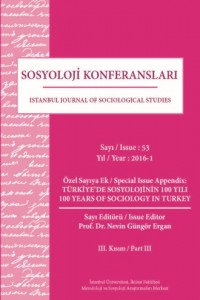Abstract
Baykan Sezer, Türk sosyolojisinin üçüncü kuşak sosyologlarındandır. Yaklaşık otuz yıl İstanbul Üniversitesi Sosyoloji Bölümü’nde görev yapmıştır. Sezer, sosyolojinin Batı’da ortaya çıktığını, Batı egemenliği çerçevesinde olayları değerlendirdiğini belirterek Batı sosyolojisine eleştirel bir yaklaşım sunmuştur. Batı sosyolojisinin tek tipçi ve Batı merkezli izahlarına özellikle karşı çıkan Sezer, sosyolojiye eleştirel bir bakış açısı sunarak yerli bir sosyoloji kurulması gereğine inanmış ve akademik yaşamı boyunca Türk toplumunun sorunlarına çözüm bulabilmek için yerli bir sosyoloji kurmaya çalışmıştır.
Sezer, metinlerinde Batı sosyolojisine ve kurucu sosyologlarına eleştiriler yöneltmiştir. Biz bu yazımızda; Sezer’in sosyoloji anlayışını kısaca izah ettikten sonra, Durkheim’ın tarihe yaklaşım biçimine, dinin menşeine ilişkin görüşlerine, metodolojik yaklaşımına ve sosyolojiyi Batı egemenliğinin temellendirilmesi için kullanmasına yönelik, onun eleştirilerini değerlendireceğiz.
Abstract
Baykan Sezer is one of the third-generation Turkish sociologists. For nearly 30 years
he worked at the Sociology Department of Istanbul University. He developed a critical
approach towards Western sociology, proposing that the discipline emerged in the West
and dealt with its subject within the framework of Western supremacy. In particular, he
rejected the uniform and West-centered interpretation, defending a critical local perspective
towards sociology. He spent his academic life in an effort to find solutions to the problems
of Turkish society, and to institute a homegrown sociology.
In his works, Sezer provided a critique of Western sociology and its founding fathers.
This essay is an exposition of Sezer’s criticism towards Durkheim’s approach to history
and methodology, his views on the origins of religion, and his use of sociology to bolster
Western supremacy. After briefly explaining Sezer’s understanding of sociology, we will
try to analyze his critique of Durkheim.
Details
| Journal Section | HISTORY OF SOCIOLOGY IN TURKEY |
|---|---|
| Authors | |
| Publication Date | July 4, 2016 |
| Published in Issue | Year 2016 Issue: 53 |

